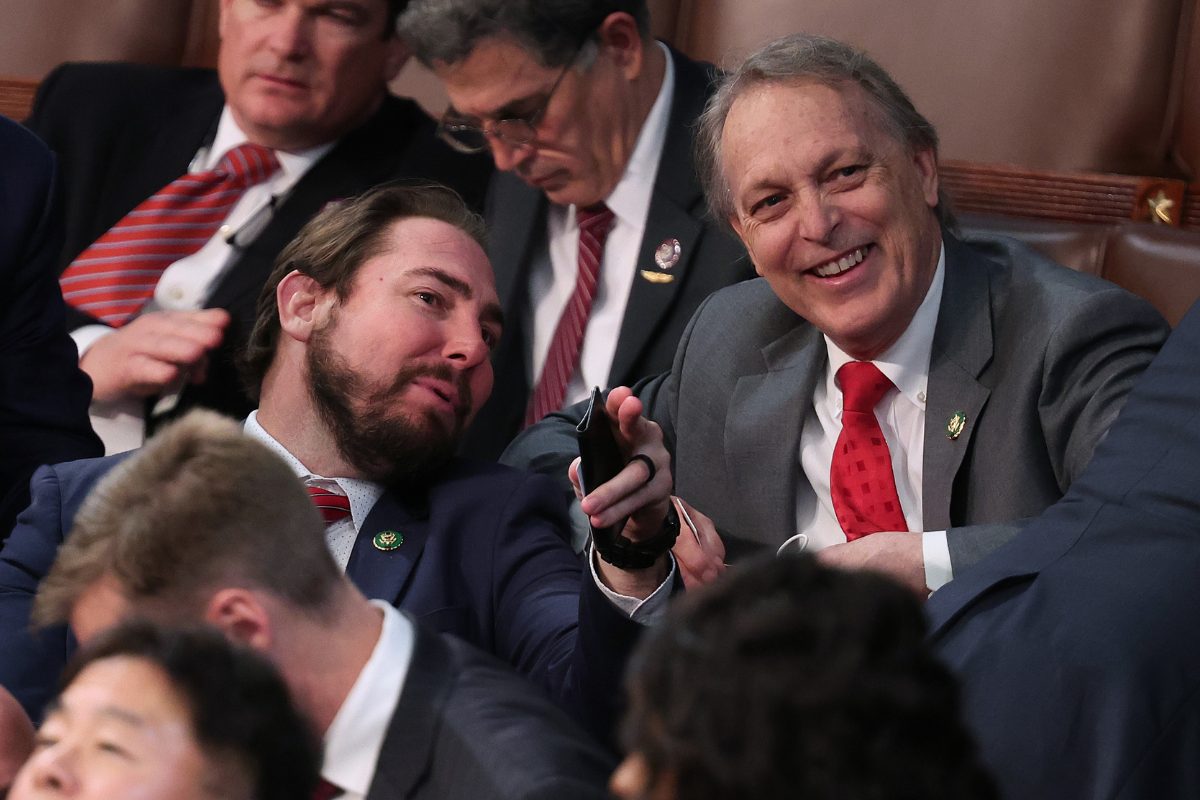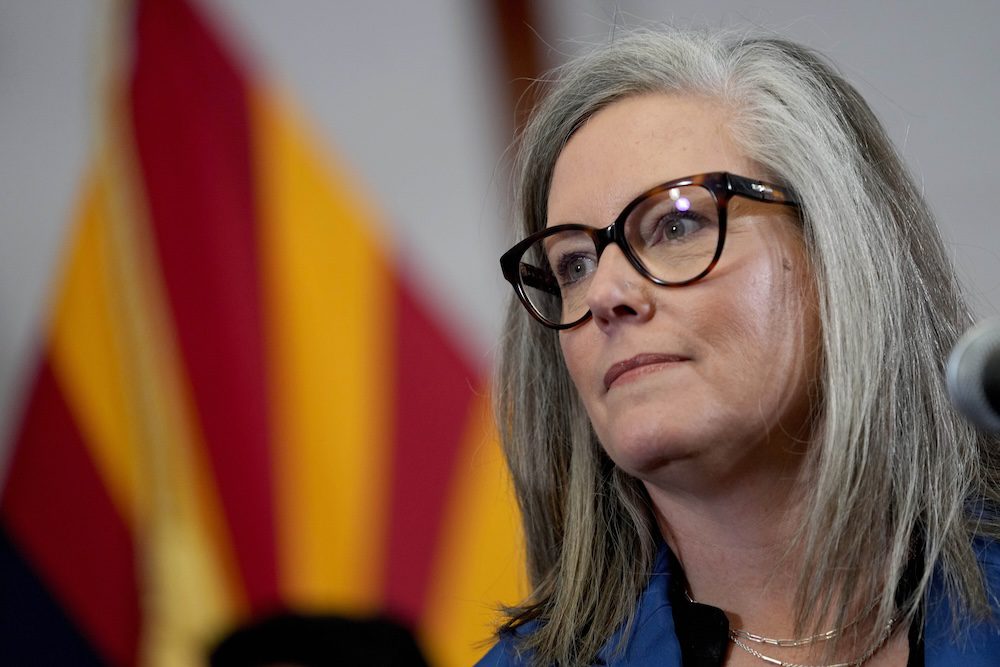
Rep.-elect Eli Crane (R-AZ) (L) and Rep. Andy Biggs (R-AZ) and other members of the House Freedom Caucus, wait for the results of a vote to adjourn following a day of votes for the new Speaker of the House at the U.S. Capitol on January 04, 2023 in Washington, DC. The House of Representatives is attempting to elect the next Speaker after House after Republican leader Kevin McCarthy (R-CA) has failed to earn more than 218 votes on six ballots over two days, the first time in 100 years that the Speaker was not elected on the first ballot. (Photo by Win McNamee/Getty Images)
US President Joe Biden signed legislation this week to improve air travel safety, cost-saving measures for passengers, and fund municipal airports in Arizona and throughout the country.
After months of negotiations, the US House and Senate overwhelmingly approved a $105 billion package to fund the Federal Aviation Administration (FAA) and authorized its continuance for the next five years. The proposal also secured priorities of the Biden administration, such as automatic refunds for canceled flights and a prohibition on seating fees that prevented families from sitting together on flights.
“The bipartisan Federal Aviation Administration reauthorization is a big win for travelers, the aviation workforce, and our economy,” said Biden. “It will expand critical protections for air travelers, strengthen safety standards, and support pilots, flight attendants, and air traffic controllers.”
Only a handful of congressional lawmakers voted against the measure, including two of Arizona’s delegates: Reps. Eli Crane, R-Tucson, and Andy Biggs, R-Gilbert. The vote appears to have little to do with air travel and more related to their political opposition to US House Speaker Mike Johnson, R-Shreveport. The two voted to remove him from his position as Speaker earlier this month, and have since opposed legislative action that could be conceived as a success for Johnson.
But the political vote not to reauthorize the FAA could have had drastic real-world consequences in Crane’s district. The bill included subsidies for essential air services, which help pay for daily roundtrip flights at airports in Page, Prescott, and Show Low. Without subsidies provided by the FAA, flights would be drastically reduced, cutting rural communities off from essential services and reducing emergency response times.
A number of Democrats in both chambers also opposed the bill, citing concerns that the safety measures in the proposal were not extensive enough.
Despite the small opposition, the bill was negotiated by Republicans and Democrats who lead the House and Senate committees overseeing the FAA, which has been under scrutiny since it approved Boeing jets that were quickly involved in two deadly crashes in 2018 and 2019.
Lawmakers in both chambers rejected a proposal from consumer groups to give state officials power to regulate airlines, but the administration separately cut a deal letting 15 mostly Democratic states help the US Transportation Department enforce federal consumer-protection rules.
Some other provisions in the bill:
— The Transportation Department will create a “dashboard” so consumers can compare seat sizes on all the airlines, but lawmakers stopped short of setting a minimum size.
— The bill would write into law that airlines must pay a refund to customers for flight delays – three hours for a domestic flight and six for an international one. The Transportation Department issued a similar regulation last week, but laws are harder for future administrations to change.
— When airlines offer travel credits instead of a refund, the credits must be valid for least five years.
— Maximum civil penalties against airlines that violate consumer-protection laws would triple, from $25,000 to $75,000.
— Starting next year, new airline planes must have cockpit voice recorders capable of saving 25 hours of audio, up from the current two hours, to help investigators. This won’t apply retroactively to planes already in use.
— Requires the FAA to increase oversight of aircraft repair shops in other countries, a key demand in recent years by U.S. airline unions, which claim the foreign shops aren’t as safe.
— Requires the FAA to create a new system for tracking and locating high-altitude balloons. This became an issue in February 2023 when a Chinese balloon drifted across the entire U.S. The military shot it down off South Carolina, but not before Secretary of State Antony Blinken canceled a high-level visit to China in response to the incident.
The Associated Press contributed to this report.
Support Our Cause
Thank you for taking the time to read our work. Before you go, we hope you'll consider supporting our values-driven journalism, which has always strived to make clear what's really at stake for Arizonans and our future.
Since day one, our goal here at The Copper Courier has always been to empower people across the state with fact-based news and information. We believe that when people are armed with knowledge about what's happening in their local, state, and federal governments—including who is working on their behalf and who is actively trying to block efforts aimed at improving the daily lives of Arizona families—they will be inspired to become civically engaged.


New rules for using purified wastewater give Arizona cities more options
PHOENIX – With dwindling water supplies, cities throughout Arizona are exploring multiple ways to meet residents’ water needs. In March, the Arizona...

Opinion: Secretary Kennedy should release energy assistance funding for families
US Health and Human Services Secretary Robert F. Kennedy Jr. recently fired the entire staff that manages the Low-Income Home Energy Assistance...

Arizona agency takes action to regulate groundwater use in rural southeast
It's necessary to regulate groundwater in Arizona's rural southeast, allowing the designation of a controlled area to stop rapid depletion of the...

Valley Metro changed its fare system: Here’s what you need to know
Valley Metro has gone paperless, so now all buses and light rail stations only accept a new “Copper Card,” or mobile fare via QR-code in a...





